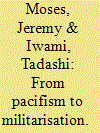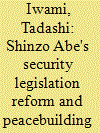|
|
|
Sort Order |
|
|
|
Items / Page
|
|
|
|
|
|
|
| Srl | Item |
| 1 |
ID:
086622


|
|
|
|
|
| Publication |
2009.
|
| Summary/Abstract |
The pacifist commitment contained in Article 9 of the Japanese constitution has long been a source of scholarly interest and debate. While the insertion of the clause in the post-Second World War constitution was originally justified by General MacArthur (amongst others) as an expression of the 'high ideals' of liberalism and democracy that Japan was now embracing, it has since been derided as an impediment to effective Japanese participation in wars fought by the United States that are claimed to be in defence of freedom and democracy. This reversal of liberal logic became evident in the early years of the Cold War as Japan was encouraged to support the US in the Korean War and has strengthened in the years since. From the first Gulf War of 1991, up to the current War on Terror, much has been made of the constraints that Japan faces in supporting the 'defence of freedom' on a global scale. This paper aims to show the place of liberal discourses in relation to the pacifist clause in order to highlight the great ambiguity and inconsistency that exists in liberal claims concerning the promotion of peace in international affairs. In the context of tensions over Taiwan and North Korea, as well as the potential for controversial 'humanitarian' roles for the Japanese military in the South Pacific, these normative questions aim to shed light on the potential dangers of Japanese remilitarisation on liberal-internationalist grounds.
|
|
|
|
|
|
|
|
|
|
|
|
|
|
|
|
| 2 |
ID:
161561


|
|
|
|
|
| Summary/Abstract |
Recent literature on Japanese foreign policy has focused on analysing the implications of Prime Minister Shinzo Abe's security legislation reform for the bilateral security alliance relationship with the US amidst a rising China and the right to collective self-defence. Its impact on Japan's multilateral security policy, in particular, peacebuilding, has so far received little attention. In what ways and to what extent does Japan play a peacebuilding role under this change? This article examines key implications of the security legislation reform, along with the renewal of Japan's Official Development Assistance charter, for its peacebuilding efforts. By taking Mindanao, the Philippines, as a case study, it argues that Abe focuses on taking a foreign aid-centred approach while showing little interest in sending Japanese Self-Defence Force. This article provides a counter-narrative to the claim that Japan is taking a more assertive approach to international security. Abe is more risk-averse as far as his approach to peacebuilding is concerned.
|
|
|
|
|
|
|
|
|
|
|
|
|
|
|
|
| 3 |
ID:
180652


|
|
|
|
|
| Summary/Abstract |
There is an increasing proliferation of bilateral strategic partnerships in and beyond the Indo-Pacific region. Yet such a partnership between Japan and New Zealand is underexplored. The central aim of this article is to fill the gap. This article first clarifies the definition of, and then provides an analytical framework for, a ‘strategic partnership’. The article then analyses how these countries laid the foundation of their strategic partnership and how they have since built upon that foundation. In the implementation process of the strategic partnership, this article examines three elements: 1) the consolidation of their strategic partnership in official documents; 2) the institutionalisation of regular meetings; and 3) participation in defence and security exercises. Although the Japan-New Zealand strategic partnership is still in the early stages, this article argues that it has the potential to grow further given bipartisan support and positive perceptions in civil society in both countries. This article also analyses three factors that exert an impact on the development of their strategic partnership: China’s continued assertive maritime presence, the rejuvenation of the US-New Zealand bilateral relationship, and Japan and New Zealand’s ongoing commitment to the South Pacific region.
|
|
|
|
|
|
|
|
|
|
|
|
|
|
|
|
| 4 |
ID:
145661


|
|
|
|
|
| Summary/Abstract |
In the post–Cold War era, Japan has developed its own version of peacebuilding in concept and practice and has taken a non-coercive approach to peacebuilding. It has been underpinned by domestic norms of pacifism. This article elaborates on the underexplored theme of Japan’s peacebuilding by focussing on its conceptual basis and three key dimensions of practice. It aims at providing a refined understanding of the Japanese version of peacebuilding, which encompasses highly comprehensive activities in and beyond troubled regions, while carefully excluding the role of military coercion. This article first presents a brief overview of the term ‘peacebuilding’ understood internationally. It then examines Japan’s understanding of the concept of peacebuilding. It consists of the ‘consolidation of peace’ as an immediate contribution to peace and human security, and ‘state-building’ as establishing and enhancing political, economic and social frameworks for durable peace in the long run. The third section of this article investigates three important dimensions of Japan’s peacebuilding practice: (1) the on-the-ground effort in troubled regions consisting of non-military peacekeeping and the provision of foreign aid; (2) taking leadership in developing principles of, and approaches to, peacebuilding in international forums; and (3) human resource development for fostering civilian peacebuilders at home. Finally, this article concludes that Japan is carving out its niche in the field of peacebuilding, suggesting that it is constructing an identity as a peacebuilder.
|
|
|
|
|
|
|
|
|
|
|
|
|
|
|
|
|
|
|
|
|